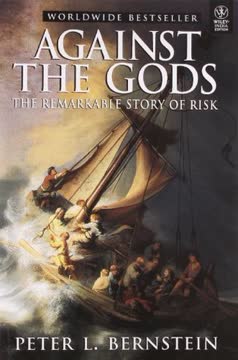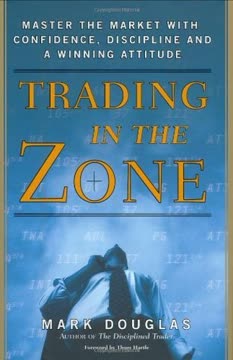Key Takeaways
1. The power of reflexivity in financial markets and society
I work with hypotheses. I form a thesis about the anticipated sequence of events and then I compare the actual course of events with my thesis; that gives me a criterion by which I can evaluate my hypothesis.
Reflexivity defined. Reflexivity is the two-way interaction between thinking and reality. In financial markets, this manifests as a feedback loop between investors' perceptions and market prices. This concept challenges the traditional economic theory of equilibrium, suggesting that markets are inherently unstable.
Implications for investing. Understanding reflexivity can provide a significant advantage in financial markets. It allows investors to identify and exploit market inefficiencies, as well as anticipate potential boom-bust cycles. Soros' success as an investor is largely attributed to his ability to recognize and act on these reflexive patterns.
Broader societal impact. The concept of reflexivity extends beyond financial markets to social and political systems. It helps explain how people's beliefs and actions can shape reality, which in turn influences their subsequent beliefs and actions. This understanding is crucial for policymakers, social scientists, and anyone seeking to effect change in complex systems.
2. Open society: A fragile ideal built on individual freedom and critical thinking
I regard freedom as the availability of alternatives. If the alternatives to one's current situation are greatly inferior, or if moving involves great effort and sacrifice, people remain dependent on existing arrangements and are exposed to all kinds of restraints, insults, and exploitation.
Freedom redefined. Open society is characterized by individual freedom, critical thinking, and the ability to challenge existing ideas and institutions. It stands in contrast to closed societies, which are dominated by rigid ideologies or traditions.
Challenges of open society:
- Lack of shared values and purpose
- Potential for social instability
- Vulnerability to manipulation and misinformation
Benefits of open society:
- Promotes innovation and progress
- Allows for peaceful resolution of conflicts
- Respects individual rights and diversity
The fragility of open society stems from its reliance on active citizen participation and a shared commitment to maintaining its principles. It requires constant vigilance and effort to preserve.
3. The fallibility of human understanding and its implications
I believe in my own fallibility. This sentence plays the same role for me as cogito ergo sum (I think; therefore I am) did for Descartes.
Embracing uncertainty. Recognizing the inherent imperfection of human understanding is a cornerstone of Soros' philosophy. This belief in fallibility encourages a critical approach to knowledge and decision-making.
Practical applications:
- Constantly questioning one's own assumptions
- Seeking out diverse perspectives
- Remaining open to new information and ideas
The acknowledgment of fallibility serves as a safeguard against dogmatism and promotes intellectual humility. It underpins the scientific method and is essential for the functioning of open societies.
4. The boom-bust cycle: A consequence of reflexive interactions
Usually some error in the act of valuation is involved. The most common error is a failure to recognize that a so-called fundamental value is not really independent of the act of valuation.
Anatomy of a boom-bust cycle:
- Initial trend emerges
- Trend reinforces itself through reflexive feedback
- Divergence between perception and reality grows
- Unsustainability becomes apparent
- Trend reverses, often leading to a crash
Examples:
- Conglomerate boom of the 1960s
- Real Estate Investment Trusts (REITs) in the 1970s
- International lending boom leading to the 1982 debt crisis
Understanding these cycles can help investors and policymakers anticipate and potentially mitigate their negative impacts. However, the inherent uncertainty in complex systems means that precise prediction remains challenging.
5. The limitations of economic theory and the need for a new approach
I think that the social sciences have done violence to their subject matter in their ambition to imitate the natural sciences.
Critique of traditional economics. Soros argues that conventional economic theory, with its assumption of rational actors and tendency towards equilibrium, fails to capture the complexities of real-world financial markets and social systems.
Proposed alternatives:
- Incorporating reflexivity into economic models
- Recognizing the role of uncertainty and imperfect knowledge
- Adopting a more interdisciplinary approach
This perspective calls for a fundamental rethinking of economic theory and practice. It suggests that policymakers and economists should be more humble in their predictions and more flexible in their approaches to managing complex economic systems.
6. Philanthropy as a means to promote open society and social change
I do it because I care about the principles of open society and I can afford it. It is a unique combination.
Strategic philanthropy. Soros has used his wealth to establish a network of foundations aimed at promoting open society principles around the world, particularly in Eastern Europe and the former Soviet Union.
Key focus areas:
- Education and critical thinking
- Civil society development
- Human rights and democratic governance
- Media freedom and access to information
Soros' approach to philanthropy emphasizes local empowerment and long-term systemic change. He recognizes the potential for both positive impact and unintended consequences in philanthropic efforts.
7. The challenge of maintaining stability in an interconnected global system
We are entering into a period of world disorder and the sooner we realize it the better our chances of preventing the disorder from getting out of hand.
Global instability factors:
- Weakening of international institutions
- Rise of nationalism and populism
- Economic inequality and financial market volatility
- Climate change and environmental degradation
Proposed solutions:
- Strengthening international cooperation
- Reforming global financial institutions
- Promoting democratic values and open society principles
Soros argues that addressing these challenges requires a recognition of our shared global interests and a commitment to collective action. He emphasizes the need for a new framework of global governance that can adapt to the realities of an interconnected world.
8. The role of values and purpose in shaping society and individual behavior
We need to invoke broader values that relate to the survival of the system and not merely to the prosperity of the individual participant.
Value deficit in open societies. Soros identifies a "deficiency of purpose" in open societies, where individuals struggle to find meaning and direction in the absence of rigid traditional or ideological frameworks.
Importance of shared values:
- Providing social cohesion
- Guiding individual and collective decision-making
- Ensuring the long-term sustainability of open societies
Addressing this value deficit requires a delicate balance between preserving individual freedom and fostering a sense of shared purpose and responsibility. Soros suggests that promoting critical thinking and civic engagement can help individuals develop their own values while contributing to the common good.
9. The dangers of dogmatic thinking and closed societies
To believe in spirits and their magic is equivalent to accepting our surroundings as being beyond our control. This attitude is profoundly appropriate to a changeless society.
Characteristics of closed societies:
- Rigid ideologies or traditions
- Limited individual freedom
- Resistance to change and new ideas
Risks of dogmatic thinking:
- Stifles innovation and progress
- Leads to social and economic stagnation
- Increases potential for conflict and oppression
Soros argues that the appeal of closed societies and dogmatic thinking often stems from a desire for certainty and simplicity in a complex world. However, he maintains that the long-term costs of such systems far outweigh any short-term benefits, emphasizing the need to actively promote and defend open society principles.
Last updated:
Review Summary
Soros on Soros receives generally positive reviews, with readers appreciating Soros's insights on investing, philanthropy, and philosophy. Many find his theory of reflexivity intriguing, though some struggle with its complexity. Readers value Soros's candid approach and self-reflection, particularly his emphasis on recognizing mistakes. The book's interview format is praised for its accessibility, though some find portions repetitive or dry. Overall, reviewers admire Soros's intellect and unique perspective, even if they don't always agree with his views.
Similar Books










Download PDF
Download EPUB
.epub digital book format is ideal for reading ebooks on phones, tablets, and e-readers.








